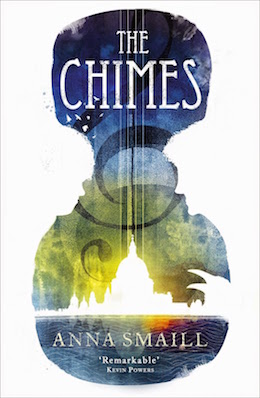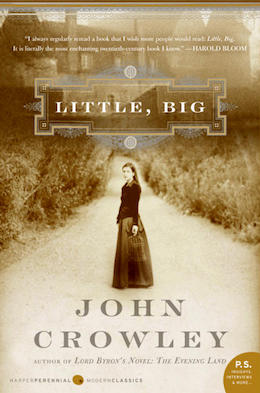Little, Big by John Crowley is a brilliant, complex, perplexing paradox of a book. It’s deeply serious and yet utterly evanescent: a sophisticated, moving adult novel about fairyland. I first came across it on the recommendation of a very well-read friend, and I fell hard for it within the first few pages. The moment I want to shout about here is the one that first prompted this headlong topple.
So, some background: the novel is that rare and old-fashioned thing, a family saga. The Drinkwaters are an American family whose home, Edgewood, is a many-faced, labyrinthine, Beaux Arts country pile, not too distant from an unnamed city that is clearly New York. Yet the Drinkwaters are special, and what makes them special is that they’re related (by marriage) to fairies. Their family history, at diverse and unpredictable points, is implicated in “the Tale”—a longstanding fairy narrative that unfolds in a rhythm too slow, too magical, for human comprehension.
One of the mysteries of the novel, and of Crowley’s brilliance, is the way he continually shifts our understanding of how the fairy Tale, and the tale of the novel, intersect. This is not a simple fantasy set-up. Some characters have direct access to the fairy world; others hunger for it and are continually, even tragically, denied; some characters live in ignorance of fairies; others dwell in disbelief. And yet, somehow, each of these perspectives are given equal weight and validity—they all hum within the novel’s grand omniscience.
In a book of many pivots and hinges of belief and will, my utter favorite occurs in the courtship of Alice Dale Drinkwater, or Daily Alice as she’s known, and Smoky Barnable, a nomadic orphan whose sole and contradictory characteristic has heretofore been one of transparency, of anonymity. The two fell in love at first sight, which had the surprising side effect of curing Smoky’s anonymity (“it was as though she stirred him with cornstarch”). They have been in the process of conducting a long-distance relationship, and this episode has them meeting for the second time, after an increasingly intimate exchange of letters. They’re endearingly awkward and brittle; they keep on talking over each other.
After a while though, as they keep chatting and things warm up, Daily Alice tells Smoky a very personal story. Long ago, when she was a child, somebody told her about him. Oh yes? says Smoky, distracted by adoration. Yes, continues Alice. When she was a child, maybe nine years old or so, she was walking in the park and came across a rainbow. She tried, as children do, to follow it to its end. “It seemed to take forever,” Alice says. Here Smoky hesitates. Is she saying what he thinks she is? She is. In the inside of the rainbow Alice saw the whole world painted in colors and then Spark spoke to her and told her all about Smoky. That was why she recognized him when they first met.
Spark is Alice’s dog.
This is a vertigo-inducing moment. A deep chasm suddenly yawns between these two worlds, these two realities. Smoky is a practical person. As a child he was liberated by the realization that “there is nothing in the world not proper to it.” Here his lover is, talking of rainbows and fairyland and speaking animals as casually as someone changing the suit in a card game. Like Smoky we too are a little dazed; we’re not quite sure of what we’ve heard, what secret we’ve been admitted into.
Yet the really enchanting bit is what happens next, both to Smoky and to us. Instead of recoiling, or dismissing what he’s heard as nonsense, Smoky steels himself for an act of will, an act of the imagination. He realizes that if he wants to remain close to Alice—as his heart dictates he must—he’s going to have to follow her into this unknown imaginative landscape. Crowley writes:
“He knew he would have to believe in order to go where she had been; knew that, if he believed, he could go there even if it didn’t exist, if it was make-believe.”
I don’t think I’ve ever read a better description of the weird alchemy of confidence-trick, seduction, faith and will that occurs in the act of reading. By the time I reached this point in Little, Big, I was as gone as Smoky. The thing I was holding was basically an ever-expanding universe within a novel-shaped nutshell. An entire secret history written in prose so transporting and self-delighting that it was only fully comprehensible via the use of the word “genius.” I didn’t care if the place Crowley was describing didn’t exist, I wanted to go there.
 Anna Smaill is a classically trained violinist and published poet. Born in Auckland in 1979, she holds an MA in Creative Writing from the International Institute of Modern Letters (Wellington), an MA in English Literature from the University of Auckland and a PhD in contemporary American poetry from University College London. The Chimes is her debut novel, long listed for the 2015 Man Booker Prize and available in the United States from Quercus Books. She has lived and worked in both Tokyo and London, and now lives in New Zealand with her husband, novelist Carl Shuker, and their daughter.
Anna Smaill is a classically trained violinist and published poet. Born in Auckland in 1979, she holds an MA in Creative Writing from the International Institute of Modern Letters (Wellington), an MA in English Literature from the University of Auckland and a PhD in contemporary American poetry from University College London. The Chimes is her debut novel, long listed for the 2015 Man Booker Prize and available in the United States from Quercus Books. She has lived and worked in both Tokyo and London, and now lives in New Zealand with her husband, novelist Carl Shuker, and their daughter.










